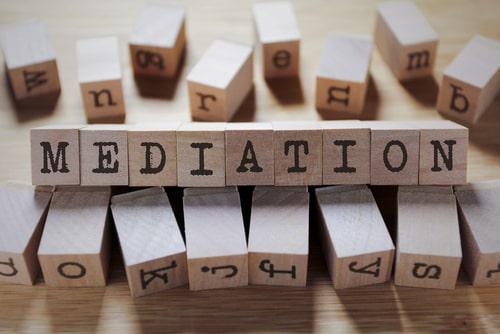Recent Blog Posts
What Happens if My Ex Ignores Our Mediated Divorce Settlement?
 Most couples who attend mediation are able to resolve their issues in the divorce. It is the best way to avoid a court battle, which can be costly and messy. It is also the most common method of alternative dispute resolution, which simply means resolving disputes without fighting them out in court.
Most couples who attend mediation are able to resolve their issues in the divorce. It is the best way to avoid a court battle, which can be costly and messy. It is also the most common method of alternative dispute resolution, which simply means resolving disputes without fighting them out in court.
When parties come to an agreement through mediation it is called a settlement. A settlement is legally binding once it is signed by the parties. If one of the spouses does not honor the divorce settlement, there are legal consequences. If you feel your ex is not abiding by your divorce settlement, contact an Illinois attorney who can explain the next steps.
What Is Mediation?
Mediation is a private process where parties in a dispute try to resolve their differences outside of court. There are a few elements to mediation:
How Does a High Income Affect A Divorce in Illinois?
 One of the most complicated parts of divorce in Illinois is assigning financial obligations. Who is responsible for child support? Who should pay alimony? How will the debt be allocated?
One of the most complicated parts of divorce in Illinois is assigning financial obligations. Who is responsible for child support? Who should pay alimony? How will the debt be allocated?
When courts make these decisions, they base them on several factors. One of those factors is the income level of each spouse. This impacts several parts of the divorce process, which is why any spouse with a high income who is considering getting divorced should consult a skilled high-income divorce attorney.
This article will discuss the different ways a high income can affect a divorce in Illinois.
Child Support
Before a court decides who should pay child support and how much should be paid, the judge will look at several factors. One of the most significant factors is the income level of each spouse. If one spouse is a stay-at-home parent with no income while the other spouse has a high net worth, the latter spouse will almost certainly be ordered to pay child support.
Prenups and Divorce: What You Need to Know
 Navigating the murky waters of divorce can be difficult, but having a prenuptial agreement can simplify the process. In Illinois, prenuptial agreements, or “prenups” as they are often called, are legal contracts entered into before marriage that lay out specific financial expectations and responsibilities. Contact a friendly and personable trusted attorney at A. Traub & Associates to ensure you can effectively utilize your prenup to make your divorce a more efficient process.
Navigating the murky waters of divorce can be difficult, but having a prenuptial agreement can simplify the process. In Illinois, prenuptial agreements, or “prenups” as they are often called, are legal contracts entered into before marriage that lay out specific financial expectations and responsibilities. Contact a friendly and personable trusted attorney at A. Traub & Associates to ensure you can effectively utilize your prenup to make your divorce a more efficient process.
The Power of Prenups is Establishing Clarity
Understanding prenups is the first step towards learning how, in a divorce, such agreements can be beneficial. Since prenups are contractual agreements that govern how different assets and liabilities get divided in the event of a divorce. Therefore, a prenup can provide couples with a very clear understanding of property rights, spousal support, and more. As a result, prenups can bring clarity in the midst of the emotional turmoil that can often take place during a divorce.
How Can My Spouse’s Gambling Addiction Affect My Divorce?
 Getting divorced opens up your personal life to legal scrutiny. Behaviors that you may previously have been able to keep under wraps can now have serious legal consequences.
Getting divorced opens up your personal life to legal scrutiny. Behaviors that you may previously have been able to keep under wraps can now have serious legal consequences.
An example of this is gambling. If your spouse has a gambling addiction and it surfaces during the divorce proceedings, it can have a major effect on the outcomes of the divorce. Seek the counsel of an experienced attorney in Illinois if you are getting divorced and think your spouse might have a gambling addiction.
This article will discuss how a gambling addiction can affect a divorce.
Assets Can Be Frozen
You and your spouse are both entitled to what Illinois law calls marital property. This refers to assets that belong to both spouses, usually acquired during the marriage. Using any of these assets for something that is not related to the marriage, or abusing them so that their value goes down, is called dissipation of assets.
My Child is Going to College. Do I Still Have to Pay Child Support?
 Making changes to child support payments, also known as child support modification, is not a simple process. Illinois law generally requires courts to wait two years before modifying a child support order.
Making changes to child support payments, also known as child support modification, is not a simple process. Illinois law generally requires courts to wait two years before modifying a child support order.
But the law also recognizes that circumstances change and sometimes it is necessary to make adjustments. If you need to modify your child support payments, contact a family lawyer in Illinois who can advise you on whether you have good cause.
This article will discuss how courts calculate child support and when you can request to modify child support payments.
How Do Courts Calculate Child Support Payments?
When calculating child support payments, courts want to find out how much a child needs and how much of that the parents can afford.
To find those answers, the court will look at several factors, including:
3 Tips for a Successful Divorce Mediation in Illinois
 The quickest way to get divorced in Illinois is through an uncontested divorce, which means that both parties agree on the terms of the divorce agreement. However, couples who cannot agree will file for a contested divorce with the help of a skilled divorce attorney. In this case, the parties will most likely be ordered by a judge to resolve their differences through mediation.
The quickest way to get divorced in Illinois is through an uncontested divorce, which means that both parties agree on the terms of the divorce agreement. However, couples who cannot agree will file for a contested divorce with the help of a skilled divorce attorney. In this case, the parties will most likely be ordered by a judge to resolve their differences through mediation.
What is Mediation?
Mediation is a legal process in which a mediator tries to help parties in a dispute come to an agreement without having to go to trial. Mediators are neutral parties appointed by the court to help both sides resolve their issues. Many of them are former judges.
A typical mediation session lasts approximately three hours. During that time, the mediator will speak to both parties together and to each one separately. The parties usually know by the end of the meeting whether an agreement will be reached. If there is a settlement, it will be submitted to a court to make it legally binding.
Illinois Collaborative Divorce Explained
 Labels can sometimes be useful because they help us understand the world by organizing it into various categories that share common traits. However, most people do not fit perfectly into labels. Things that work for one person might not work for another, and the way one person reacts to something can be completely different from how someone else would react to the same situation.
Labels can sometimes be useful because they help us understand the world by organizing it into various categories that share common traits. However, most people do not fit perfectly into labels. Things that work for one person might not work for another, and the way one person reacts to something can be completely different from how someone else would react to the same situation.
That is why there are several different ways of ending a marriage. Every couple, including couples who no longer want to be together, has its own unique dynamic and ways of dealing with situations. For some couples, the idea of fighting out their divorce in court simply does not suit them. People who meet the conditions necessary and have the means required to do so might consider trying to end their marriage through what is known as collaborative divorce. This article will explain what that means, and if this seems like it might be a good option for you to consider, speak with an experienced Arlington Heights, IL divorce attorney to find out more.
How Are Retirement Plans Impacted by Divorce in Illinois?
 Anytime a couple goes through a divorce, they need to figure out how exactly they will divide all of their debts and assets. This means they need to consider the bank accounts that they currently use as well as anything they have put away for their retirement. Someone who has been working all their adult life and slowly putting away money to finance their retirement might be concerned that all their hard work was in vain and their spouse is going to take everything. If you are going to get divorced and worried about the fate of your retirement funds, an Arlington Heights, IL divorce attorney can review your specific case and offer insight and guidance for moving forward.
Anytime a couple goes through a divorce, they need to figure out how exactly they will divide all of their debts and assets. This means they need to consider the bank accounts that they currently use as well as anything they have put away for their retirement. Someone who has been working all their adult life and slowly putting away money to finance their retirement might be concerned that all their hard work was in vain and their spouse is going to take everything. If you are going to get divorced and worried about the fate of your retirement funds, an Arlington Heights, IL divorce attorney can review your specific case and offer insight and guidance for moving forward.
Will My Spouse Get Half of Everything I Have Been Putting Away for My Retirement?
Generally speaking, any assets acquired by either spouse during the marriage will be considered marital assets and will be subject to a division of assets in a divorce settlement. On the other hand, anything acquired before the couple was married will likely be considered nonmarital assets and not need to be divided.
What Happens to Hidden Bank Accounts in an Illinois Divorce?
 Anytime a couple gets a divorce, they need to go through something called division of assets. The couple and their legal representatives need to determine what will be considered marital assets, properties, and debts and which are non-marital. In the State of Illinois, anything that is a marital asset or debt needs to be fairly divided by both spouses in divorce. Unfortunately, many people try to take advantage of the system by hiding some of their assets so that they will not be divided. Whether this is done to punish their future ex or just to ensure their own financial gain, a common method used for this illegal practice is to hide marital assets in offshore accounts, which are harder to gain access to. If you suspect that your spouse may try to hide marital assets in offshore accounts, you should consult with a trustworthy Arlington Heights, IL hidden asset attorney to consider how you might want to proceed.
Anytime a couple gets a divorce, they need to go through something called division of assets. The couple and their legal representatives need to determine what will be considered marital assets, properties, and debts and which are non-marital. In the State of Illinois, anything that is a marital asset or debt needs to be fairly divided by both spouses in divorce. Unfortunately, many people try to take advantage of the system by hiding some of their assets so that they will not be divided. Whether this is done to punish their future ex or just to ensure their own financial gain, a common method used for this illegal practice is to hide marital assets in offshore accounts, which are harder to gain access to. If you suspect that your spouse may try to hide marital assets in offshore accounts, you should consult with a trustworthy Arlington Heights, IL hidden asset attorney to consider how you might want to proceed.
When Mediation Might Not Be a Good Idea in an Illinois Divorce
 There are several ways people can end their marriage. Some people settle their divorce through litigation, some have an uncontested divorce, and some can work out all the aspects of their divorce settlement through mediation. Mediation often allows for a marriage to be legally ended with less stress and lower costs. However, it is not suitable for all scenarios. If you are wondering whether divorce mediation is the right method for you, speak with a knowledgeable Arlington Heights, IL divorce lawyer to find out more.
There are several ways people can end their marriage. Some people settle their divorce through litigation, some have an uncontested divorce, and some can work out all the aspects of their divorce settlement through mediation. Mediation often allows for a marriage to be legally ended with less stress and lower costs. However, it is not suitable for all scenarios. If you are wondering whether divorce mediation is the right method for you, speak with a knowledgeable Arlington Heights, IL divorce lawyer to find out more.
When Is Mediation Unsuitable?
When a couple decides to try to settle their divorce through mediation, they need to communicate in a clear and honest way and express what they truly want. The mediator passes questions, information, answers, and any other messages between the two spouses until they ultimately reach a mutually acceptable agreement. with the media Mediation is not advisable under certain circumstances, including:

















